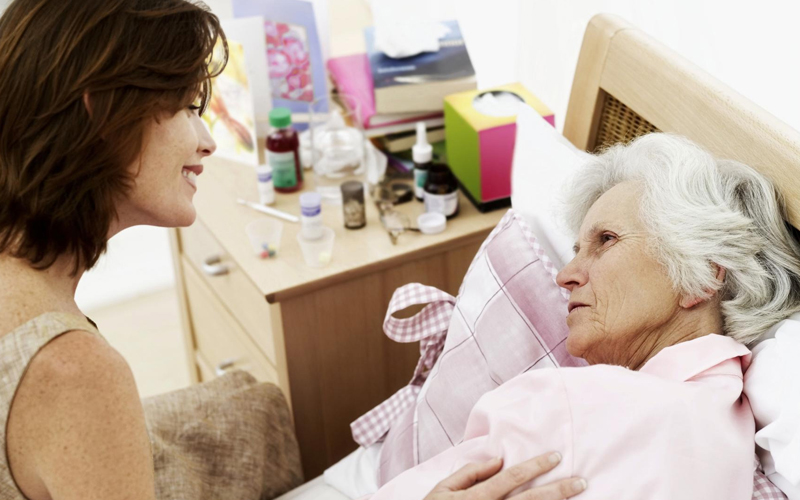Care in your community
Ensuring loved ones stay healthy while on the ward is simpler than you think. Lisa Salmon discovers how to make hospitals happier.
Visiting the sick in hospital isn’t usually a barrel of laughs, but concerns that some patients are dying hungry and thirsty could mean visits from friends and family become more crucial.
Official figures published this week suggest that up to three patients a day may be malnourished or dehydrated when they die in hospital, although the Office for National Statistics, which compiled the figures, stresses that many such patients will have had illnesses such as Alzheimer’s, or a cancer that made it difficult or impossible to eat or drink.
Nevertheless, if visitors kept a keener eye on patients who are so ill they can’t look out for themselves, experts say their general wellbeing could be improved. Royal College of Nursing chief executive and general secretary Dr Peter Carter says there are real benefits for patients whose families get involved with care. “We would never suggest that relatives perform tasks nurses are trained and paid to do, or indeed that they should be compelled to carry out any task,” he stresses.
“However, we know from areas such as dementia care that simply having familiar people present, who’ve known the patient for years and are aware of their preferences, can make hospital stays less stressful for all concerned.” Katherine Murphy, chief executive of the Patients Association, also says visitors should be encouraged by hospitals to use their time productively.
“Very often, people just sit there – if they find a chair. There’s very little visitors can do. It would be much better if hospital trusts were more creative about visiting and used it productively.” This, she says, could mean taking patients for a short walk, if possible. “Visitors would then feel they were getting something out of the experience too,” she says, adding that they can also pass on patients’ questions to medical staff, as well as their own.
VISITOR HURDLES
Actually getting to the hospital during visiting time can be tough, as times vary tremendously between hospitals, and there are no national guidelines about when they should be.
“Some hospitals are quite happy to accommodate visitors for short bursts,” says Murphy. “Others are very regimental, with just two hours in the afternoon and another two in the evening. “I think that’s probably acceptable to most, as it must be remembered that these are sick people and they need time to rest.” Another policy that differs between hospitals is whether children are allowed on the ward or not. In many cases they’re not permitted unless the patient is their parent. Hefty parking charges also make visits difficult, says Murphy: “This is a huge problem which must be tackled. A system needs to be put in place to cater for those who genuinely need to park close to the hospital,” he underlines. “Finding a parking space is a problem too. We get a lot of complaints about it all.”
ONLINE VISITS
If you’re finding it difficult to visit someone in hospital, a new website justvisiting.com could help. The site aims to keep relatives and friends who can’t visit in person up to date with their loved one’s progress through a virtual visiting network.
The main visitor registers free on the site, and opens an online visiting room, which is a secure social networking space. They can then post updates on the patient’s progress for other registered friends and family. Michael Lavery is one of the creators of the not-for-profit website, which is run by volunteers and is currently supported by 30 NHS trusts. “The site allows people who can’t visit the hospital to get an update on the patient’s progress,” he explains. “Care staff also benefit with fewer telephone enquiries and better informed visitors.” Responsibility to update the online visiting room lies with the person who created the room, but messages of support for the patient and their visitors can be posted by other family members and friends.
“This is about giving some support to hospital visitors,” says Lavery. “Patients tell us it’s wonderful, because they’re often worried about the amount of visiting their son or daughter, for example, is doing, and it’s a relief to know their loved one has found a way to keep everyone else informed about their progress very quickly.” He insists that using the site doesn’t mean a reduction in visitors for patients, who might look forward to seeing a familiar face during their hospital stay.
“It’s ideal for people who don’t feel it’s really their place to visit, or family members who live too far away. It doesn’t deter people from actually visiting, but keeps them up to date without bothering nursing staff.”
PATIENTS ASSOCIATION HOSPITAL VISITING TIPS
:: Don’t visit if you’re ill with any infection (such as a cold). If in doubt, check with ward staff beforehand. If you’re taking antibiotics, you may be vulnerable to hospital infections yourself.
:: Take wipes with you and use any infection control methods provided on the wards, such as hand gel.
:: Think before you touch the patient: Are your hands and face clean?
:: Don’t sit on the patient’s bed – it could transfer dirt and germs.
:: Check visiting hours in advance.
:: Make sure there are only one or two visitors at a time.
:: Check with the hospital if there are rules about gifts. Some hospitals won’t allow flowers on some wards. The hospital shop will sell gifts that pass the ‘ward test’.
:: Always wash your hands if you use hospital toilets.
:: Be vigilant – if you see something that makes a patient more vulnerable (e.g. full waste bins) point it out to a member of staff.
:: For information and advice on patient matters, contact the Patients Association helpline on 0845 608 4455
Written by: By Lisa Salmon, Press Association
Latest posts by Sally - Silversurfer's Editor (see all)
- Would you like to take a flight into space? - April 14, 2025
- Brunch muffins with poached eggs, asparagus tips and smoked bacon - April 14, 2025
- What’s the best part of Easter the Weekend? - April 14, 2025
- The Boom Radio All Time Chart - April 11, 2025
- Discover Oregon: Your Ultimate Adventure Awaits with Non-Stop Flights from London Heathrow - April 11, 2025




















